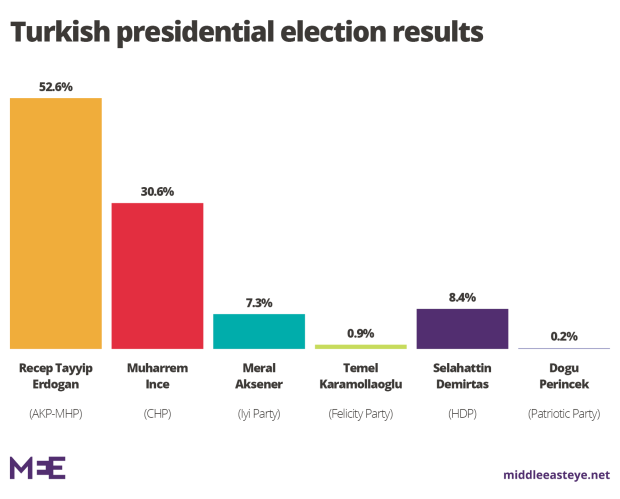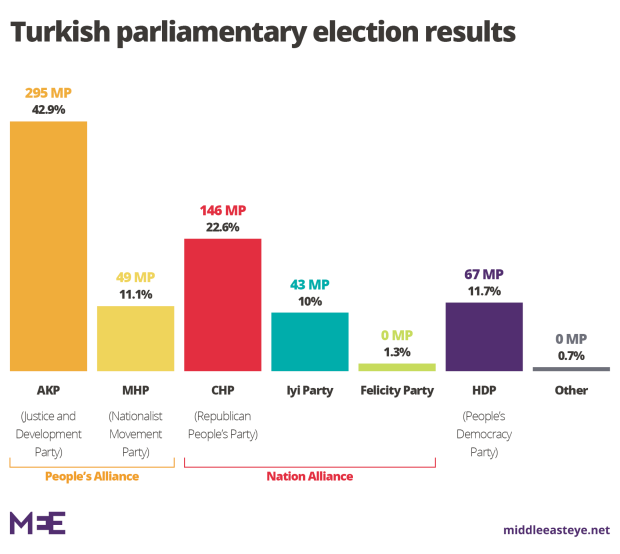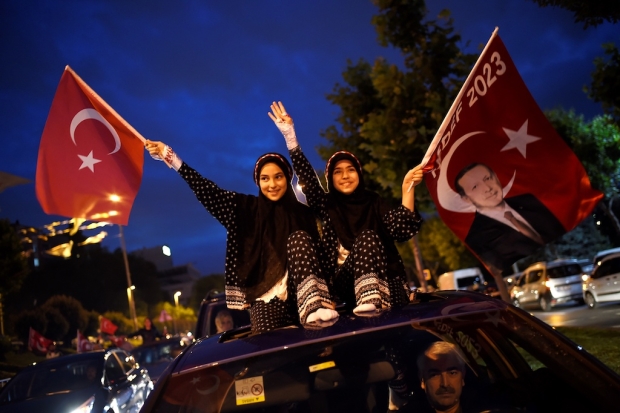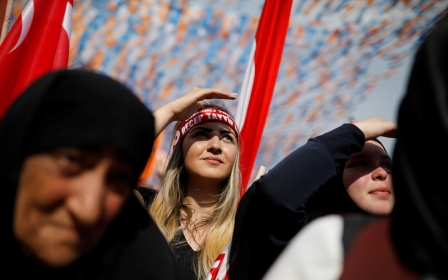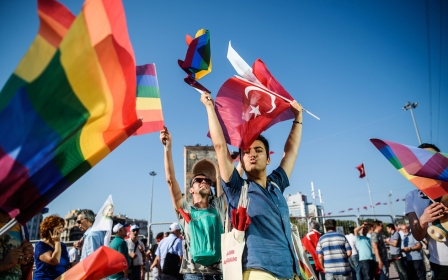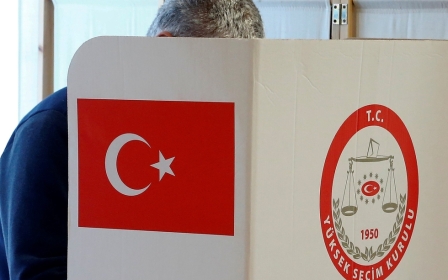Erdogan calls for unity as he is declared victor in Turkish elections
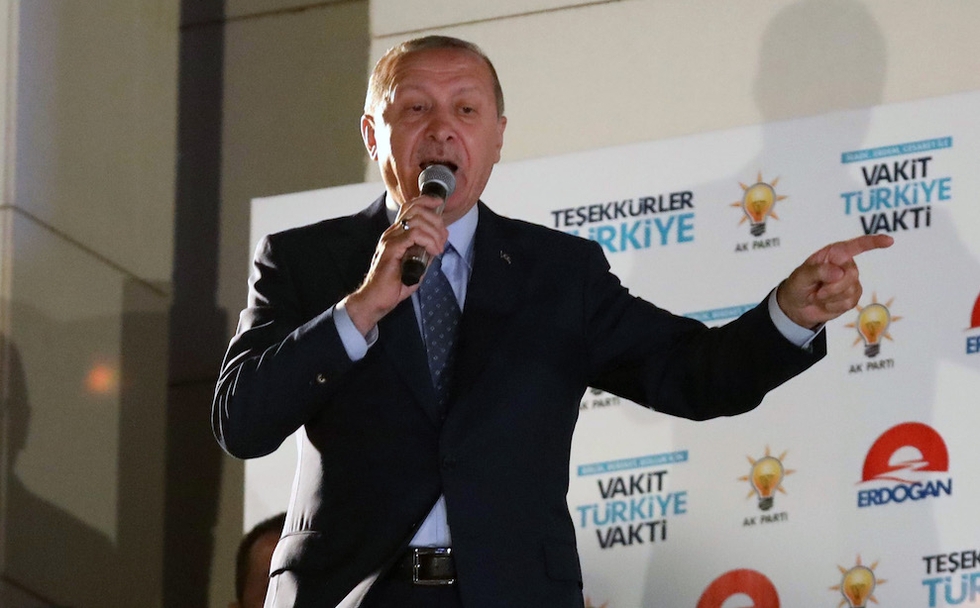
Recep Tayyip Erdogan was re-elected president of Turkey on Sunday in a hotly contested vote that will see him take the helm of an enhanced presidential system.
With 52.55 percent of the vote, the long-standing president won without the need for a second round in the presidential elections, although critics argued that conditions were lacking for a free and fair vote.
Final results are still set to be published by the Supreme Election Board (YSK) later this week, but early on Monday chairman Sadi Guven declared Erdogan the winner.
Although the ruling Justice and Development Party (AKP) lost its majority in the parliamentary elections, its electoral coalition with the far-right Nationalist Movement Party (MHP) means Erdogan maintains an effective majority in the parliament.
As markets opened on Monday morning, the lira rose 3 percent against the dollar, a reassuring sign for observers of a currency which had fallen dramatically against the dollar since the beginning of the year.
Speaking to supporters from the AKP headquarters in Ankara, Erdogan attempted a conciliatory tone, promising expanded civil liberties.
“Our flag will flutter more freely, the peace of every citizen will be advanced,” he said, calling for "one nation, one flag, one country, one state.
“For these, these four, we should be one, we should be awake, we should be fresh, and we should be brothers, and all together we will constitute Turkey.”
World leaders congratulated Erdogan on his success with Palestinian Authority President Mahmoud Abbas saying he wished Turkey "more success, progress, and stability", and Russian President Vladimir Putin saying the results of the vote "fully speak of Recep Tayyip Erdogan's great political authority (and) mass support of the course conducted under his leadership to solve Turkey's pressing social and economic tasks (and) strengthen the country's position on the international arena."
However, a delegation from the Organisation for Security and Cooperation in Europe (OSCE) warned on Monday that while voters had a genuine choice in the elections, there had been "no equal opportunities" and warned there had been "a number of attacks and disruptions of campaign activities, mostly against the People’s Democratic Party (HDP)."
"The media landscape is dominated by outlets whose owners are considered affiliated with the government or depend on public contracts, which limits the diversity of available views," said the report.
They added that "citizens demonstrated their commitment to democracy by participating in large numbers in campaign rallies and on election day."
The United States welcomed Turkey's electoral results but added that the ruling AKP Party should "strengthen democracy". UK Prime Minister Theresa May similarly endorsed the results, saying she wished to continue working in various partnerships.
Erdogan is set to the take the helm of a new "super-presidency" which was narrowly approved in a referendum last year. The position of prime minister is set to be abolished, while Erdogan will acquire the ability to appoint ministers and establish and repeal states of emergency, among other new powers. Critics have claimed that the new powers cement "one-man rule" in the country.
Do we really want to get the state back or not? What's the price? How can the CHP leadership be so cowardly?
- Ali Tirali, CHP activist
Muharrem Ince, the candidate for the opposition Republican Peoples Party (CHP), conceded defeat on Monday morning in a WhatsApp message sent to the Halk TV channel, although he maintained that the race - which took place under a state of emergency - had not been fair.
In a news conference on Monday, he said that there had been fraud, but conceded that Erdogan had still won.
"We have broken the 30 percent psychological barrier that had not been broken in 40 years. My ambition was to receive even 35 percent but this has not happened at this time," he said.
"Has there been fraud? Of course. Has there been fraud to impact 10 percent? No... if you can not congratulate your opponent after the elections, you should not run."
Supporters on social media had been critical of his absence following the results spreading the hashtag #İnceNerede (Where's Ince) on Twitter.
Some supporters expressed their anger the CHP's performance, which saw them achieve a lower percentage of the vote share than in the previous November 2015 elections, despite what had been viewed as an energetic campaign.
"Do we really want to get the state back or not? What's the price? How can the CHP leadership be so cowardly?" tweeted youth activist Ali Tirali.
Perhaps the most surprising result from the election was the success of the MHP, who are in a political coalition with the AKP.
Even though the party splintered last year with the formation of the rival Iyi Party, and despite the unpopularity of leader Devlet Bahceli, the party managed to increase its number of seats from the previous election, defying poll numbers.
The party, which has long been deeply hostile to Kurdish aspirations, even managed to come ahead of the CHP in most Kurdish-majority regions, despite the latter's active attempt to court the Kurdish vote.
'Unjust conditions'
Supporters of the left-wing pro-Kurdish HDP also celebrated on Sunday as their party managed to pass the 10 percent threshold required to enter the parliament.
The party, which currently has seven MPs in jail - including its presidential candidate Selahattin Demirtas - had been sharply critical of the voting conditions in the southeast.
Clashes repeatedly broke out both on the day of the vote and in the run-up, between government supporters and opposition activists.
Opposition politicians posted videos and photos on social media they claimed showed ballots being dumped into boxes or thrown away. Election authorities said that a number of cases were being investigated.
Among those elected to parliament for the HDP was Ahmet Sik, an investigative journalist who spent time in jail over alleged terror links.
“Do not lose hope, there has taken place an election with lack of justice or transparency under unjust conditions," he said in a statement on Monday morning.
"This country has shown great resistance to an organised crime network. The results do not show any despair, we will resist till the end.”
This country has shown great resistance to an organised crime network. The results do not show any despair, we will resist till the end.
- Ahmet Sik, HDP MP
Sik was one of tens of thousands who had been arrested in Turkey since a July 2016 coup attempt. Hundreds of thousands have also lost their jobs, as the government attempted to purge institutions of supporters of US-based cleric Fethullah Gulen, whom Erdogan blames for the coup.
The election has also come against the backdrop of increasing economic woes, including high inflation, high youth unemployment and a falling lira.
While the lira's bounce on Monday morning has calmed some investors, analysts have warned that the respite may be only temporary.
“In the past, Turkish assets have responded positively to political events that were perceived as increasing political stability,” said analysts at Goldman Sachs, prior to the election, according to the Wall Street Journal.
“However, President Erdogan’s comments on monetary policy during the election campaign - advocating lower interest rates and indicating that he would play a more active role in monetary policy - have raised concerns over the future direction of monetary policy in the event of this outcome."
Middle East Eye propose une couverture et une analyse indépendantes et incomparables du Moyen-Orient, de l’Afrique du Nord et d’autres régions du monde. Pour en savoir plus sur la reprise de ce contenu et les frais qui s’appliquent, veuillez remplir ce formulaire [en anglais]. Pour en savoir plus sur MEE, cliquez ici [en anglais].


